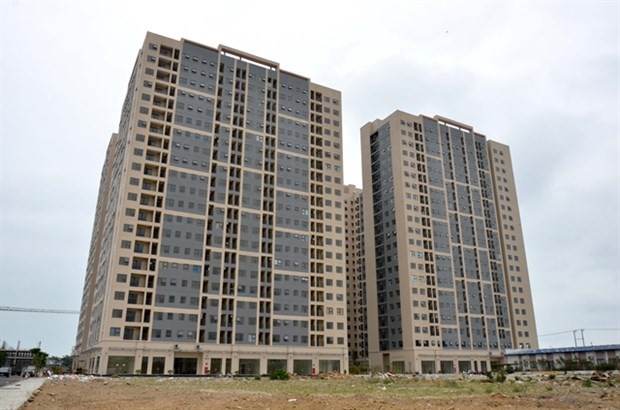The establishment of a land use rights trading floor will help this market operate in an open, transparent, healthy and sustainable manner, said experts.

Two apartment blocks in Da Nang city, which were coming up for sale in early 2023. (Photo: VNA)
Such an exchange is vital for the centralised management of the realty sector, said Deputy Minister of Natural Resources and Environment Le Minh Ngan at a governmental meeting on August 21.
Ngan said a market for land use rights had taken shape but was operating unstably due to the absence of a centralised platform.
The launch of such a platform would help investors obtain realty property more easily and provide the government with the tools to control realty prices more effectively.
"The need to establish a platform on which land use rights can be traded is urgent," noted Ngan.
Echoing Ngan, Deputy Prime Minister Tran Hong Ha said a centralised national platform for land use rights trading would create a conducive environment for private platforms.
What ministries had to do now to pave the way for the platform, Ha said, is to define its operational mechanics and its responsibilities towards businesses, set the criteria for their admission to the platform, and establish a mechanism under which data among platforms can be transferred.
Prior to the meeting, the Ministry of Natural Resources and Environment and the Ministry of Construction were working on a scheme to launch a platform on which land use rights can be traded.
Nguyen Chi Thanh, Vice Chairman of the Vietnam Association of Realtors, said the exchange would serve as a centralised hub where land use rights can be bought, sold, and exchanged.
However, its significance would extend far beyond transaction facilitation. It would pave the way for a real-time database whereby financial watchdogs can monitor real estate transactions more effectively.
In the long term, it would also deliver a correction to the realty market and thwart any attempt to create speculative bubbles on it.
"A land use right exchange run by realtor associations is not new to many countries, but not so be the one under the State's management," said Thanh.
The deputy chairman also said it would take a lot of time to get the exchange up and running, given the amount of work required to establish its legal framework and digital platform.
Tran Khanh Quang, director of the Viet An Hoa Real Estate Investment JSC, said the exchange would help unlock the full potential of the realty market by bringing sellers and buyers together in a single centralised platform.
Dang Hung Vo, former Deputy Minister of Natural Resources and Environment, said only when the exchange is established as a State-authorised public service provider could it gain popularity at the grassroots level.
He also said the existing platforms for real estate trading are functioning as private service providers. They have no authority to verify transactions. Verification falls under the competence of notarial offices.
"A land use right exchange will be infeasible unless its ties with land registration offices and notarial offices are established," said Vo.
Realty expert Phan Cong Chanh said the real estate platforms and the exchange will differ in that future property can be traded on the former whereas it would not be the case for future land use right on the latter.
Mai Van Phan, director of the Department of Land Registration and Information Database, said his department was working to lay the groundwork for the exchange and would soon report to the Prime Minister on its progress.